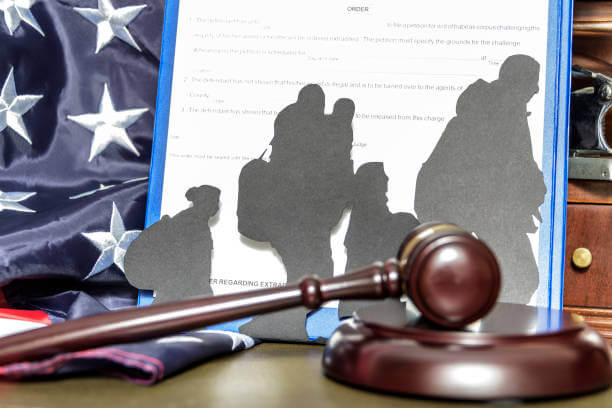Also known as a migratory waiver, an immigration pardon is a pardon granted by the U.S. government to aliens who have violated U.S. laws.
It is usually granted to any immigrant alien who is found inadmissible within the United States after having violated the law.
When applying for any type of U.S. visa, immigration authorities first check to see if the applicant in question has a criminal record within the United States that would make him/her inadmissible.
If found, the authorities will declare you inadmissible and you will not be able to obtain any type of visa or Green Card that would allow you legal entry into the United States. It is at this moment when it is necessary to apply for a legal migratory waiver.
In this type of case, without an migratory waiver, the immigrant will not be able to obtain any kind of visa legally, nor will he/she be able to obtain a Green Card. Green Card even if he/she meets all the requirements.
If you or a family member is experiencing problems entering the United States due to prior court cases, contact the offices of Urbina Immigration Law. An experienced attorney from our firm will provide you with the legal assistance you need.
Table of contents
What kind of crimes can be pardoned?
Although not all offenses can be pardoned, there are some grounds of inadmissibility that can be pardoned by following the proper procedures.
However, keep in mind that the range of offenses for which you may be barred from entering or deported from the United States is extremely broad: national security reasons, health reasons, fraud, false statements, and unlawful presence, among others.
But we will name here the three most common causes from which you can be exempted by migratory waiver.
Illegal presence in the United States.
Immigrants who are in the U.S. illegally, facing sentences ranging from 3 to 10 years, can avoid punishment by applying for an I-601A waiver.
Generally, this migratory waiver can be applied for through an interview at a U.S. consulate abroad, but always seek professional advice before beginning any process.
An experienced immigration attorney can help you find the best options to secure legal entry into the United States.
If you or a loved one entered the United States illegally, Urbina Immigration Law is here to help. Contact our offices and an experienced attorney will provide you with all the help you need with your I-601A waiver..

Immigration Fraud Or Misrepresentation
Those who obtained an migratory benefit through fraud or misrepresentation may be eligible to apply for an migratory waiver.
However, immigrants who falsely claim to be U.S. citizens will not be able to apply for a waiver of the offense.
Criminal records
A criminal record may be grounds for inadmissibility to the United States.
However, a migratory waiver can be applied for through section 212(H) if the offense in question is one of the pardonable felonies.
If that is the case, immigrants may be eligible for a waiver if they meet the following requirements:
- Have a U.S. citizen or permanent resident spouse, fiancé, child, parent, or parent who would suffer extreme hardship if denied admission.
- More than 15 years must have elapsed since the offense was committed and admission to the United States was sought.

What types of immigration waivers are there?
There are currently 10 types of migratory waivers, but the three most common are the I-601, I-601A and I-212.
The I-601
The Form I-601 (also known as an migratory waiver of inadmissibility waiver) is used when an immigrant wishes to obtain permanent residency in the United States and has a criminal inadmissibility waiver on file.
Some of these felonies are:
- Drug possession
- Prostitution
- Lack of vaccines
- Immigration fraud
It also exempts from deportation children, spouses or fiancées of citizens or lawful permanent residents.
To apply for an I-601 migratory waiver you must have at least one U.S. citizen or permanent resident family member (spouse, parent, or child) who can demonstrate extreme hardship if the beneficiary is unsuccessful in obtaining a waiver.
Also remember that, before filing a Form I-601, you should make sure that all sections of the applicant’s information are complete:
- Last name.
- Date of birth.
- Mailing address.
- Information about the applicant.
Also, please note that if the form is not signed, the application may be rejected.
The I-601 A
The Form I-601A is applied for when the only crime of the immigrant applying for U.S. residency is having entered the country illegally or having remained in the United States after the expiration of his or her nonimmigrant visa.
This migratory waiver is used when the immigrant is living in the United States and is in consular processing (interview at the consulate of his or her home country) to apply for permanent residency.
The applicability requirements are:
- Have a U.S. resident or U.S. citizen spouse.
- Have a U.S. citizen or resident parent.
The I-202
This is an application for permission to re-enter the United States after having been deported or removed. If you have been declared inadmissible because you have been deported from the United States and wish to return to the country, you may apply for an I-202 waiver.
However, you should not enter the United States until your I-212 application is approved. You can request a Form I-202 in the course of the punishment imposed depending on the circumstances and offense committed by the deportee.
Please note that there are penalties ranging from 3 to 10 years of ineligibility to enter the United States. They are set according to the reasons for their deportation and the crimes committed.
In addition, the I-212 waiver only allows certain migrants to apply for permission to re-enter the United States before serving the sentence imposed on their deportation. Therefore, you should consult with an immigration attorney to analyze your case and assist you in the process.
If you have doubts about whether you can apply for an I-212 waiver, here at Urbina Immigration Law we can help you. Contact us now to have our experienced attorneys review your case and provide you with all the legal assistance you need.
On the other hand, the I-212 waiver has some subcategories depending on the crimes it pardons. Here are some of the most requested.
Section 212 (D) (3): Waiver of inadmissibility for nonimmigrants
The waiver allows a U.S. Attorney General to waive most inadmissibility cases for aliens seeking to temporarily enter the country.
For example, it is granted to immigrants seeking to apply for a B-1 business visa or an H-1B visa.
Notwithstanding the breadth of pardonable offenses, it is not available for all grounds of inadmissibility. Non-dischargeable offenses include terrorism, espionage, participation in genocide, Nazi persecution and drug trafficking.
Section 212 (I): Fraud and misrepresentation
With this exemption to fraud or misrepresentation the immigrant may be admitted to the United States.
However, there are two conditions that must be met in order to apply:
- Be the spouse or child of a U.S. citizen or resident.
- Demonstrate that, if the applicant were denied admission, it would result in extreme hardship to the qualifying relative.
Section 212(A) (1): Inadmissibility on Health-Related Grounds (Health-Related Grounds)
This is an migratory waiver for foreigners with a cause of inadmissibility related to health.
It may be caused by a contagious disease or certain mental or physical conditions. Those who do not have the necessary vaccinations may also apply.
Section 212(H): Inadmissibility for criminal offenses
This migratory waiver can be used by the immigrant to obtain or maintain the Green Card having already a criminal conviction, either by:
- Crimes of moral turpitude (e.g., attempted robbery).
- Convictions for 2 or more offenses in which the total sentence was 5 years or more.
- Prostitution.
- Drug possession (e.g., 30 grams of marijuana or less).
In turn, 212(H) is subdivided into three categories based on the requirements to be met by applicants. These are:
Exemption 212h of 15 years
The applicant must demonstrate that the inadmissible activities occurred more than 15 years ago, that he or she has been rehabilitated, and that, if allowed to enter the United States, he or she will not affect national security.
212h hardship exemption
If inadmissible for any qualifying offense, the immigrant may apply for this waiver if he or she can show that he or she has a U.S. citizen relative who would suffer extreme hardship in his or her absence.
212h exemption for battered spouse
This is a migratory waiver for inadmissible applicants who suffer abuse by a spouse or U.S. resident.
It may be required for both a Green Card application and a U.S. visa. U visa visa or a T visa.
Whatever your case may be, it is extremely important that you seek professional legal advice from an immigration attorney to look at your case and choose the best option.
Here at Urbina Immigration Law we are here to help you. If you or a family member are experiencing legal problems with your immigration status, contact our offices. An experienced attorney will give you all the legal help you need.
Can I apply for an migratory waiver in the United States?
In most cases, the immigrant can apply for a waiver within the United States. In addition, depending on the type of waiver you apply for, leaving the U.S. could be a mistake that would make your situation worse.
However, remember that you should always seek professional legal advice to organize your options according to the particularities of your case.
How do I apply for an migratory waiver?
To apply for a waiver or migratory waiver you must follow the following steps:
1) Complete the appropriate type of waiver form (I-601, I-601A or I-212 respectively).
2) Review and send the form to USCIS.
3) Wait for the approval of the waiver by said entity.
4) Schedule an interview with the immigration officer in charge (if you have left the country, you will have the interview with a U.S. embassy or consulate official).
5) Wait the indicated time until you receive the notification to re-enter the United States. It is extremely important that you do not attempt to return before you receive it, as you could face serious penalties.
It is also advisable to complete the Form G-1145 so that you can receive electronic notifications regarding approved migratory waivers.
Do I have to pay for the migratory waiver?
Yes, the application for migratory waiver must be paid. However, the amount varies depending on the type of waiver requested. The most common costs are:
– $930 for I-601 waiver (with a delay of approximately 12 to 16 months)
– $715 for I-601A waiver (with a delay of approximately 6 to 12 months)
– $930 for the I-212 waiver (approximately 6 month delay)
Fees can generally be paid by personal check, cashier’s check or money order. You can also pay by credit card by completing the following form Form G-1450.
Please note that if paying by check, it should be made payable to the U.S. Department of Homeland Security.
Where can I file an application for an migratory waiver?
Addresses vary depending on the type of waiver you are requesting. Below is a list indicating the locations where they should be submitted.
– Applications Under VAWA:
USCIS Vermont Service Center
38 River Road
Essex Junction, VT 05479-0001
– Applications for immigrant or nonimmigrant visas (K or V Visa):
USCIS
Attn: I-601 Foreign Filers
P.O. Box 21600
Phoenix, AZ 85036-1600
– Applications For Form I-485 Filings:
Applicants who have filed Form I-601 along with Form I-485, must follow the instructions of the last one.
If the form is pending, check if it begins with “MSC” or “IOE” and that it does not have a 3-letter code at the beginning of the receipt number. If this is the case, then it should be sent to:
– USPS:
USCIS
Attn: AOS
P.O. Box 805887
Chicago, IL 60680
– FedEx, UPS y DHL:
USCIS
Attn: AOS (Box 805887)
131 S. Dearborn-3rd Floor
Chicago, IL 60603-5517
– Applications with a pending Form I-485:
If you have not yet filed Form I-485, you should check whether it begins with “EAC,” “SRC,” or “WAC,” then send it to:
USCIS
Attn: NFB
P.O. Box 660867
Dallas, TX 75266-0867
If you or a family member are experiencing legal problems with your immigration status, contact our offices. An experienced attorney will give you all the legal help you need.
Other articles that may interest you
Classification of Deportations in the U.S.
How to avoid deportation in the U.S.: the complete guide
Can a deportation order be removed?
What to do if I have a deportation order?
How to Apply for Voluntary Departure: Steps, Benefits and Requirements
Penalty for Voluntary Departure: Advantages and Disadvantages
Can I arrange papers if I have a voluntary departure in the U.S.?
10-Year Law in the USA: What is it about and how can it help me?
Permanent Residence for Victims of Violence or Crimes
How to recognize and prevent scams in immigration procedures
Immigration fraud: know its implications
Top 10 Most Common Myths about Immigration to the U.S.
Temporary Protected Status (TPS): Legal Requirements and Benefits


